The Golden Dawn or Thoth Method
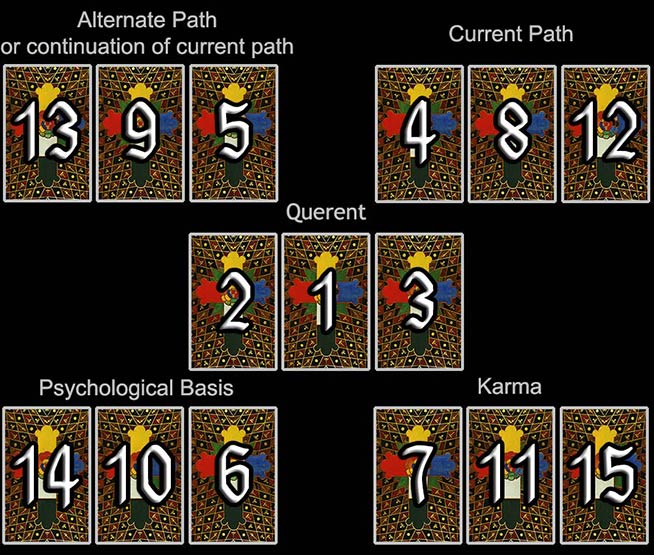
Difficulty: Complicated
Note: Tarot decks that use reversed cards such as the Rider-Waite do not work well with this spread, which was designed to be read using elemental dignity.
The Golden Dawn spread is best suited for use with the bifrost Tarot and especially the Book of Thoth, as these decks are meant to be read a certain way with the court cards. Princes and queens represent actual men and women connected with the matter, while princesses generally represent ideas; thoughts or opinions, and knights represent arrival or departure of a matter depending on the direction faced.
In this tarot spread, particular attention should be paid to a card's exact position in relation to its neighbours. Whether the neighbour cards bear the same energy (suit) determines whether a card is considered well-dignified or ill-dignified. Opposite suits ill-dignify each other, while other suits are considered friendly. Tarot cards of the same suit or element strengthen each other.
As with other tarot spreads, it is important to count the cards' tendencies, such as whether there is a lot of one particular suit or number pattern. The patterns reveal special messages. Having several majors present indicates higher forces at work, several cups suggest strong emotions, etc.
Card #1 represents the reader and the nature of the topic at hand.
Cards #2 & #3 are read in extension of #1 to further comprehend the nature of the topic.
The two sets of three tarot cards at the top of the spread represent chronological sets of events. The current path as it would unfold naturally is represented by cards #4, #8, & #12. The alternate path that could be taken is represented by cards #13, #9, & #5. However, if the reader gets the feeling these cards are telling them they go together, then the alternate path is to be considered an extension of the current path, and to be read chronologically in this order: #4, #8, #12, #13, #9, #5. Just keep in mind: this is only if the two paths seem particularly similar.
Cards #14, #10, & #6 shed light upon the psychological undertones of the current issue.
Cards #7, #11, & #15 represent the influences of karma and destiny beyond the reader's control. These cards suggest adapting to this, as fate.
Your Golden Dawn Reading
| The Alternate Path (or Extension of Current Path) |
Your Current Path |
|||||
Nine of Wands (Strength) |
Five of Cups (Disappointment) |
XVII – The Star |
Three of Cups (Abundance) |
Prince of Disks |
Knight of Swords |
|
| The Querent | ||||||
Queen of Wands |
Nine of Cups (Happiness) |
XVIII – The Moon |
||||
| The Psychological Basis | Karma | |||||
Three of Wands (Virtue) |
Prince of Cups |
Four of Disks (Power) |
Six of Wands (Victory) |
Ten of Swords (Ruin) |
Seven of Cups (Debauch) |
|
The Querent
cards represent the querent and the nature of the topic at hand. The first card (in the center of the spread) represents the very core of the matter, and the other two cards around it are added to it in order to further comprehend the nature of the topic.
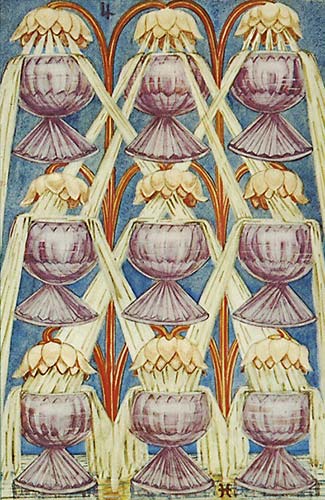
Astrological Correspondence: Jupiter in Pisces
The Nine of Cups represents joy, emotional abundance, and the fulfilment of heartfelt desires. This card depicts nine cups arranged symmetrically, overflowing with clear, pure water, symbolising the harmonious flow of emotional energy. The imagery exudes completeness and satisfaction, reflecting the culmination of efforts that lead to genuine happiness.
Jupiter in Pisces combines the expansive, benevolent energy of Jupiter with Pisces' intuitive and empathetic nature, creating a powerful alignment of emotional depth and generosity. This pairing amplifies the sense of boundless joy, compassion, and the effortless manifestation of desires.
The Nine of Cups signifies a time of emotional contentment and the realisation of aspirations. It encourages you to revel in your achievements, appreciate the beauty of life's blessings, and share your joy with others. While it is a card of celebration and abundance, it also reminds us to remain open to the continuous flow of emotional energy, ensuring that happiness is not stagnant but ever-renewing.
In Relationships: The Nine of Cups signifies the satisfaction of emotional desires. It can indicate the fulfilment of a romantic wish, such as finding true love, an emotionally harmonious relationship, or strengthening an existing bond. There is contentment and emotional satisfaction in the romantic sphere.
In Work: The Nine of Cups represents emotional fulfilment through one's work. It suggests you are on the path towards achieving your professional goals and are experiencing success and satisfaction. This is a card of recognition, where you can bask in the joy of your accomplishments.
Spiritually: The Nine of Cups is a card of emotional and spiritual fulfilment. It suggests a time of peace, harmony, and the realisation of spiritual desires. You may feel aligned with your higher self and at peace with your spiritual journey.
When ill-dignified: The Nine of Cups can indicate emotional overindulgence, satisfaction derived from shallow or materialistic pursuits, or complacency. It can point to a temporary sense of fulfilment that does not last, leading to emotional emptiness after the initial joy fades.
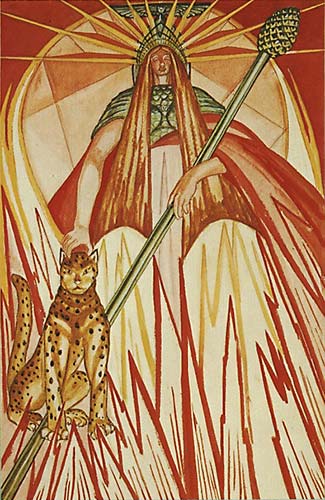
Element: Water of Fire
Astrological Correspondence: Cancer
The Queen of Wands represents the emotional and nurturing qualities of Water combined with the dynamic power of Fire. As Water of Fire, she embodies the balance of intuition, compassion, and creativity with the strength and vitality of fiery inspiration. The Queen channels her energy in a way both magnetic and nurturing, guiding and protecting what she creates with emotional depth and wisdom.
This card signifies a person who possesses the ability to inspire and lead through emotional intelligence and nurturing energy. While the Princess and Prince represent the beginnings of creative expression and active drive, the Queen of Wands embodies the harmonious flow of that energy, managing it with confidence, care, and resilience. She is a visionary who nurtures her creations, empowering others with her dynamic yet empathetic approach. The Queen of Wands encourages you to trust your intuition, inspire those around you, and take a balanced, compassionate approach in your leadership and creative endeavours.
In Relationships: The Queen of Wands represents a relationship of passion and emotional depth. She is the nurturing force behind the bond, who maintains balance and harmony with great strength. Her love is fierce, protective, and encouraging, creating an environment where both partners feel empowered to grow.
In Work: This card represents a person in a position of leadership who uses both intuition and intellect to guide their endeavours. The Queen of Wands knows how to balance assertiveness with empathy, leading by example and encouraging others to step into their own creative power. In the workplace, she represents a role model or mentor figure, someone who nurtures the growth of others through her example and leadership.
Spiritually: The Queen of Wands is a leader who embodies creative expression and the nurturing aspects of spirituality. She encourages you to embrace your personal power and trust your intuition. There is an emphasis on self-love and self-expression in her influence, guiding you towards a harmonious relationship with your spiritual path.
When ill-dignified: The Queen of Wands can represent emotional volatility, arrogance, or an abuse of power. She may become controlling or demanding, using her charm to manipulate others. The Queen, in this state, may be too emotionally driven and fail to maintain balance, leading to disharmony or unnecessary conflict.
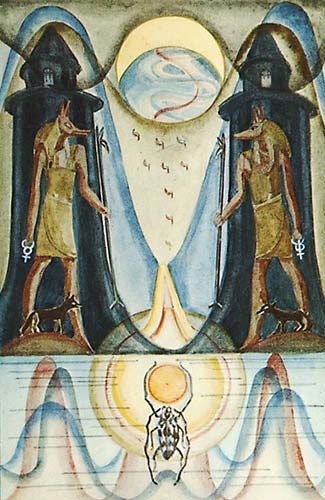
(Pisces, Qoph)
The Moon symbolises illusion, intuition, and the mysterious depths of the subconscious. Associated with Qoph, the back of the head, this card delves into the primal and instinctual aspects of the psyche. Pisces, the zodiac of dreams and mysticism, enhances the card's themes of mystery and emotional depth.
The imagery is haunting and enigmatic. A path winds through barren terrain, flanked by twin towers that suggest gateways to the unknown. Above, the moon dominates the sky, casting an eerie light that obscures as much as it reveals. Crawling on the path is a scarab beetle carrying the solar disk, symbolising the emergence of light from darkness. The waters below teem with life, representing the fertile chaos of the subconscious.
In Relationships: The Moon represents emotional complexity and hidden dynamics. It encourages you to trust your intuition and uncover underlying truths.
In Work: This card suggests uncertainty or confusion. You are advised to navigate carefully, relying on intuition and patience to discern the best path forward.
Spiritually: The Moon symbolises the journey through the subconscious and the mysteries of the soul. It calls you to explore your inner depths and embrace the wisdom found in dreams and intuition.
When ill-dignified: The Moon warns of deception, confusion, or fear of the unknown. You are advised to confront your fears and seek clarity amidst uncertainty.
Your Current Path
cards represent your current path as it would unfold naturally. These cards are read in chronological order from left to right.
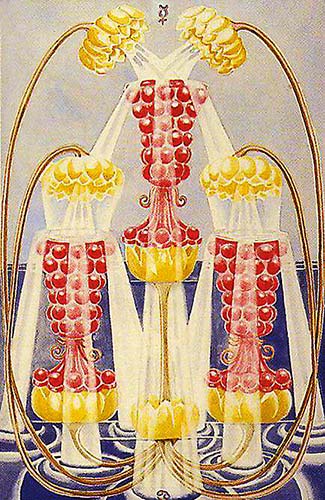
Astrological Correspondence: Mercury in Cancer
The Three of Cups, or Abundance, represents celebration, emotional fulfilment, and the joy of unity. It symbolises the flow of emotional energy shared between individuals in a harmonious, collective experience.
The card depicts three chalices floating in the water, surrounded by a vast sea. This imagery speaks to emotional harmony and the satisfaction of celebrating together. The card conveys communal joy, highlighting the strength of emotional connections and the importance of shared experiences in creating lasting bonds.
In Relationships: In romantic terms, the Three of Cups signifies a relationship enriched by friendship, mutual joy, and emotional companionship. It speaks to the celebratory aspects of love, where two people come together not only as lovers but also as friends, sharing in mutual happiness and enjoyment.
In Work: In a professional context, the Three of Cups indicates successful teamwork, collaboration, and a celebratory atmosphere within the workplace. This card suggests a time to celebrate collective achievements, where the entire team or group works well together to achieve success. There is an emphasis on positive, uplifting energy in the work environment.
Spiritually: The Three of Cups is about emotional unity and connection with others on a soul level. It may represent a time when the seeker feels deeply connected to a community or a higher purpose, where spiritual joy is shared with others. This card encourages you to celebrate your spiritual journey and share your light with others.
When ill-dignified: The Three of Cups can indicate overindulgence, excessive partying, or shallow relationships. It may suggest a lack of depth in social interactions, where people are more concerned with surface-level pleasures than meaningful connection. This card warns against using distractions like excessive drinking or partying to avoid deeper emotional work.
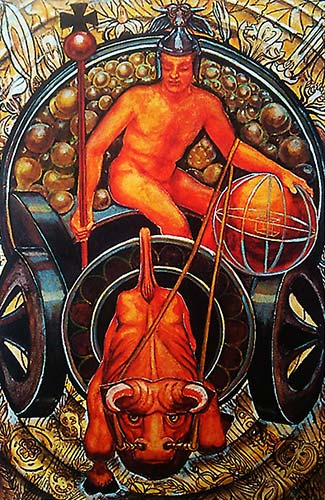
Element: Air of Earth
Astrological Correspondence: Taurus
The Prince of Disks represents the active, dynamic force within the Earth element, embodying the drive and determination needed to manifest material success. The Prince is depicted as a youthful figure holding a large disk, symbolising his connection to the material world and his unwavering focus on achieving practical goals. His element, Air of Earth, combines intellectual energy and strategy with the solid, grounding qualities of Earth. This fusion empowers him to take disciplined action in pursuit of material gain and stability.
The Prince of Disks is steadfast, practical, and diligent, bringing order and purpose to his endeavours. He represents a force of transformation in the material realm, working tirelessly to build lasting structures, wealth, and prosperity. While the Princess embodies receptive and nurturing qualities of Earth, the Prince is the active counterpart, initiating the processes that lead to tangible results. His approach is grounded in intelligence and practicality, ensuring that his goals are not only visionary but also achievable.
This card signifies the power of focused effort and the importance of perseverance in creating lasting success in the physical world. It encourages a balanced, methodical approach to manifesting desires, and serves as a reminder that patience and hard work will lead to prosperity and stability.
In Relationships: The Prince of Disks indicates a steady, committed individual who brings stability and reliability. He may represent someone willing to work hard to ensure the relationship's success, and who values loyalty and practicality in love. The Prince often symbolises a partner who brings financial or material security to the relationship.
In Work: The Prince of Disks signifies diligence, persistence, and hard work. This card points to someone dedicated to their career who works steadily towards material success. It may also indicate someone undertaking a project that requires consistency and long-term effort to bring results.
Spiritually: The Prince of Disks calls for a grounded and disciplined approach to spiritual work. He suggests that spiritual progress comes through steady, practical efforts and that one must apply the same dedication to spiritual growth as one would to material pursuits. The card also points to balancing spiritual goals with worldly responsibilities.
When ill-dignified: The Prince of Disks can indicate stubbornness or inflexibility, especially in material matters. It may suggest an overemphasis on work or the material world to the detriment of other aspects of life, such as relationships or spiritual growth. There may be a tendency to become too entrenched in your goals or ways of thinking, leading to stagnation.
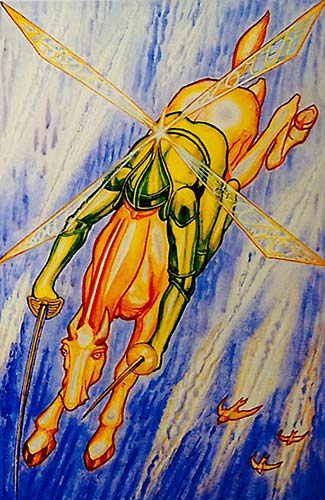
Element: Fire of Air
Astrological Correspondence: Gemini
The Knight of Swords represents an intense, fast-moving force of intellect and action. He charges through the air with fierce determination, embodying the quick, forceful qualities of Air in motion. The Knight's swift movement symbolises his drive to deliver ideas and messages, pushing forward with unrelenting focus and mental energy. His actions are rapid and decisive, like a whirlwind of thought and communication, sometimes chaotic in their intensity.
This card signifies the action-oriented aspect of the Air element—taking intellectual concepts and turning them into tangible actions. However, the Knight of Swords can also represent the dangers of rushing forward without considering the consequences. His speed and energy may sometimes lead to hasty decisions or the need to reconsider the path after action has already been taken.
The Knight of Swords challenges you to embrace your intellectual power and take bold action but also reminds you of the need to temper that drive with caution, ensuring your pursuit of ideas does not lead to unintentional harm or misdirection. His energy encourages directness but warns against impatience.
In Relationships: The Knight of Swords can signify sudden and forceful communication or an intellectual attraction that dominates the emotional connection. Relationships may progress rapidly, but arguments or disagreements may also mark them if the parties involved are not careful in their approach. The Knight can indicate the need for quick, clear communication, but also suggests avoiding impulsive, hurtful words.
In Work: The Knight of Swords represents a fast-paced, intellectually driven professional environment. This is a person determined to achieve success by force of will, intellect, and swift action. However, this card can indicate that you might need to slow down and consider the consequences of your actions before you rush ahead. It's easy to become caught up in the speed of success and miss important details.
Spiritually: The Knight of Swords symbolises a quest for intellectual enlightenment, often seeking truth and knowledge through sharp analysis. This card can indicate a sudden spiritual awakening or an urge to rush towards spiritual goals but also warns that the pursuit of intellectual clarity can overshadow emotional or intuitive wisdom.
When ill-dignified: The Knight of Swords indicates impulsive, reckless behaviour driven by hasty thoughts and actions. You may rush into situations without thinking them through, leading to chaos or conflict. It's important to exercise caution and avoid becoming too forceful or aggressive in pursuing goals. This card can also point to misunderstandings or cutting words that cause damage to relationships or situations.
The Alternate Path
cards represent the alternate path that you could choose to take in lieu of the Current Path. However, if the cards that come up seem to indicate that they go along with the Current Path, these three cards should be interpretted not as an Alternate Path, but as a chronological extension of the Current Path (also read from left to right).
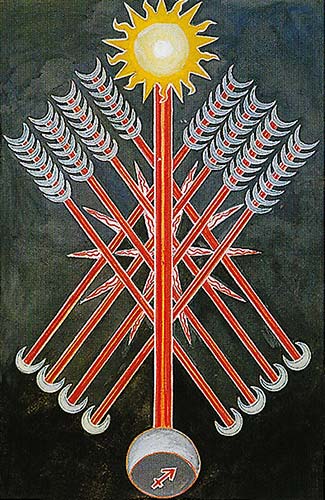
Astrological Correspondence: Moon in Sagittarius
The Nine of Wands represents resilience, inner strength, and the perseverance needed to overcome challenges. This card features nine wands arranged in a structured yet dynamic pattern, radiating energy and determination. The Moon brings intuition, emotional depth, and adaptability, while Sagittarius contributes an optimistic and expansive drive, resulting in a card that embodies enduring strength amidst adversity.
This card signifies the ability to push forward despite difficulties, maintaining resolve and focus even when the path is arduous. It reflects the culmination of effort, where one has faced many battles and emerged stronger, though perhaps weary. The Nine of Wands encourages you to trust your instincts, remain vigilant, and protect what you have worked hard to achieve. It is a reminder that the final stretch of a challenge requires courage and unwavering determination.
In Relationships: The Nine of Wands represents a period where you may feel guarded or defensive because of experiences. It suggests a time of emotional resilience, where you are protecting the relationship or your heart but still willing to continue fighting for love.
In Work: This card indicates that you have faced many obstacles in your career or pursuits and are now standing strong, prepared to face any further challenges. It calls for perseverance and the belief that you can overcome any remaining difficulties.
Spiritually: The Nine of Wands speaks to spiritual endurance. You may have gone through difficult periods in your spiritual path but have come out stronger. This card encourages you to remain vigilant and steady as you continue your journey.
When ill-dignified: The Nine of Wands can indicate weariness, defensiveness, or being overwhelmed. You may feel like giving up or be too focused on old wounds to move forward. It warns against becoming too rigid or entrenched in past difficulties.
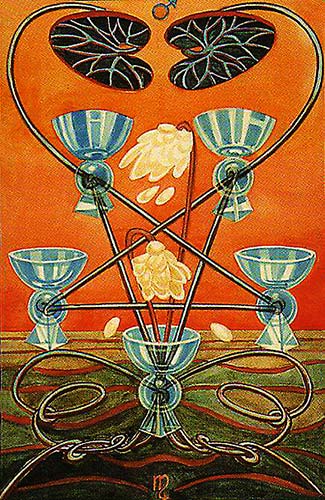
Astrological Correspondence: Mars in Scorpio
The Five of Cups represents emotional sorrow, disappointment, and a focus on the negative aspects of an emotional situation. It speaks to moments of grief, regret, or mourning, especially when someone is caught up in the emotional aftermath of a loss.
The five cups are arranged in a pentagram formation. The arrangement of the cups signifies emotional disconnection or frustration, with the structure symbolising a closed, introspective emotional state. This card suggests a focus on what has been lost, often pointing to emotional difficulty or missed opportunities. However, the upright cups hint at the possibility of new emotional experiences or opportunities that may be overlooked because of the current focus on loss.
In Relationships: The Five of Cups represents grief or emotional loss. There may be feelings of disappointment or regret, and you may be mourning a past relationship or the end of a particular phase. It's important for you to remember that healing and new emotional opportunities are available if you choose to focus on them.
In Work: The Five of Cups suggests emotional setback, loss, or failure. You may have experienced disappointment in your career, but the card also encourages you to focus on opportunities that remain. The Five of Cups is a reminder that there are always new directions to explore, even when setbacks occur.
Spiritually: The Five of Cups can represent emotional pain or disillusionment with the spiritual journey. You may be mourning your perceived failures or feeling disconnected from your spiritual practices. However, the card encourages a shift in perspective, reminding you to look towards healing and renewal.
When ill-dignified: The Five of Cups can represent prolonged grief or an inability to move past emotional loss. You may be stuck in a cycle of self-pity or emotional stagnation, failing to see the positive opportunities that remain. There may be an excessive focus on the negative aspects of a situation, hindering emotional recovery.
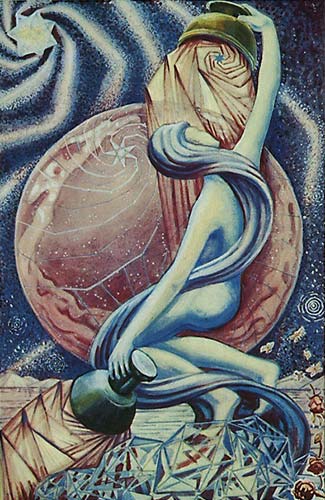
(Aquarius, Heh)
The Star represents hope, inspiration, and the flow of divine energy. Associated with Heh, the window, this card symbolises clarity and the opening of the soul to cosmic light. Aquarius, the zodiac of vision and humanitarian ideals, imbues the card with themes of enlightenment and universal connection.
The central figure is a nude woman, representing purity and vulnerability, pouring water from two vessels—one onto the earth and the other into a pool, symbolising the balance between spiritual and material realms. Behind her, a radiant star dominates the sky, surrounded by smaller stars, signifying guidance and hope. The background, rich with blues and violets, evokes the tranquillity of the natural world.
In Relationships: The Star suggests healing and renewed hope. It encourages you to trust in the flow of love and remain open to its guidance.
In Work: This card signifies inspiration and creative potential. You are advised to trust your intuition and align your efforts with a higher vision.
Spiritually: The Star symbolises a connection to the divine and the flow of universal energy. It calls you to share your gifts and have faith in the cosmic plan.
When ill-dignified: The Star warns of disillusionment, a loss of faith, or a failure to see one's potential. You are advised to reconnect with your inner light and trust in the process of renewal.
The Psychological Basis
cards shed light upon the psychological undertones of the current problem.
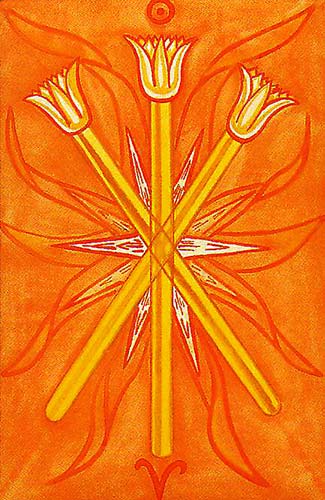
Astrological Correspondence: Sun in Aries
The Three of Wands represents the harmonious alignment of will, action, and purpose. It symbolises confidence, leadership, and the strength to act with integrity. The card depicts three wands crossed in balance, radiating stability and mutual support. Flames emanate from the centre, representing the creative and dynamic energy of fire that has been focused and directed constructively.
This card is about the manifestation of one's will through effort and coordination. It marks the point where initial efforts have taken root and a solid foundation has been established, allowing for continued growth and success. Unlike the chaos of unbridled ambition, the Three of Wands reflects a disciplined and virtuous use of power, ensuring that actions align with one's higher principles. It is a card of optimism, self-assurance, and the momentum to build upon early achievements.
In Relationships: The Three of Wands indicates growth and development. The connection has reached a point where both parties can begin to see the potential for a shared future and greater commitment.
In Work: This card suggests you are beginning to see the first signs of success from previous efforts. It encourages you to continue building on their foundations and look forward to even greater accomplishments.
Spiritually: The Three of Wands represents the expansion of spiritual knowledge and understanding. It signifies progress and the beginning of a deeper connection with the divine.
When ill-dignified: The Three of Wands may suggest overconfidence, impatience, or a lack of focus. You could be spreading yourself too thin or expecting results too quickly. It advises careful planning and the need to be patient as the process unfolds.
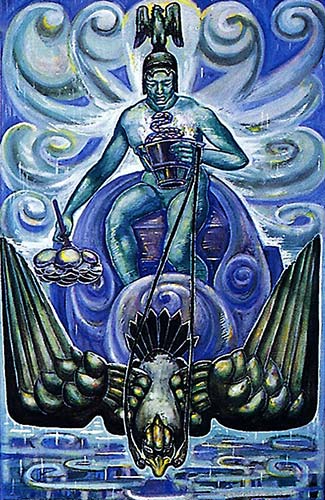
Element: Air of Water
Astrological Correspondence: Scorpio
The Prince of Cups represents the dynamic interplay between intellect and emotion, where Air's exploratory nature merges with Water's depth and intensity. As Air of Water, he embodies a figure of emotional complexity and intellectual curiosity, driven by a quest for deeper meaning and truth, pulled by an eagle. He is depicted as a charioteer navigating turbulent waters, holding a cup that symbolises his pursuit of emotional and spiritual insight.
This card highlights the active force of intuition and the transformative power of emotions guided by intellectual focus. The Scorpio influence intensifies his inner depth, imbuing his journey with passion, determination, and a willingness to explore the unknown realms of the heart and soul.
The Prince of Cups invites you to harness your emotional wisdom and channel it into meaningful action. While his intensity and curiosity can lead to profound insights and transformative experiences, he also cautions against becoming consumed by emotional extremes or illusions. He inspires you to balance your emotional depth with clarity and purpose, pursuing your desires with confidence and integrity.
In Relationships: The Prince of Cups represents someone idealistic, emotionally expressive, and perhaps on a quest for love or emotional fulfilment. This card can indicate someone emotionally open but who may be swept away by their emotions or desires for romantic ideals.
In Work: The Prince of Cups can point to a career path that requires creativity, intuition, and emotional intelligence. He may represent a person who uses their emotional depth and insight to drive their professional goals or a time when you are pursuing a career that aligns with your emotional passions and desires. However, the Prince also suggests ensuring you stay grounded, as you could become distracted by your emotional dreams or ideals.
Spiritually: The Prince of Cups speaks to an emotional journey where intuition and feelings guide you. This card indicates you are on a spiritual quest to connect more profoundly with your emotions and intuitive wisdom. It suggests a time of emotional exploration propelled by intellectual curiosity and the search for higher truths.
When ill-dignified: The Prince of Cups can indicate emotional instability or a tendency to act impulsively based on fleeting feelings. You may become overly idealistic, leading to disillusionment when reality doesn't align with your fantasies. There may also be a tendency to escape into emotional distractions, rather than facing challenging feelings head-on.
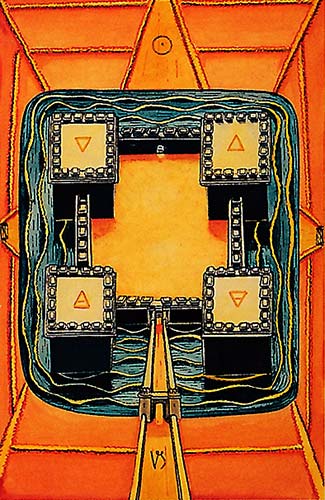
Astrological Correspondence: Sun in Capricorn
The Four of Disks (Power) represents the solidification and consolidation of material wealth and security. The imagery of four square disks arranged symmetrically evokes stability, emphasising the creation of a solid foundation and the control one has over their material circumstances. This card symbolises the mastery and protection of financial resources and the ability to maintain power and stability in the physical world.
The Four of Disks reflects a time when material security is established, and you are likely in a position of control over your material situation. It highlights the importance of maintaining discipline, focus, and practicality in securing one's wealth, but also warns against the potential rigidity or over-attachment to material possessions. The influence of the Sun in Capricorn encourages a steady, strategic approach to building and preserving wealth, ensuring that power and stability are achieved through responsible, enduring effort. This card represents a moment of mastery in managing one's material world.
In Relationships: The Four of Disks may signify stability and security but can also indicate possessiveness or control. It may suggest that you are focusing on maintaining the material aspects of a relationship, such as financial security, at the expense of emotional depth or freedom.
In Work: The Four of Disks suggests financial stability and control over one's material resources. It indicates success in business or career, particularly through careful management and conservation of resources. The card advises maintaining control and not taking unnecessary risks with financial matters.
Spiritually: The Four of Disks may suggest that you are focusing too much on the material or outward manifestations of spirituality and not enough on inner growth. It may be a reminder to let go of the need for control and allow more freedom and flow in your spiritual practice.
When ill-dignified: The Four of Disks represents a fixation on materialism, greed, or possessiveness. You may be too conservative with your resources, unable to let go of control. It can indicate insecurity masked by an outward appearance of power, or the inability to adapt to changing circumstances.
Karma
These cards represent the influences of karma and destiny that are beyond your control. They suggest adapting to this fate.
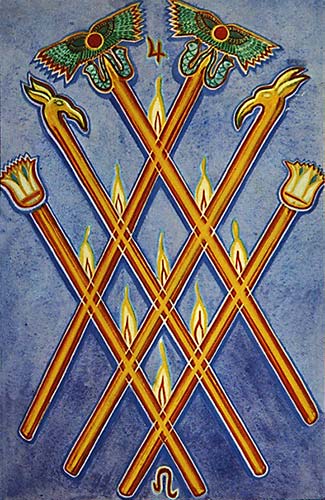
Astrological Correspondence: Jupiter in Leo
The Six of Wands represents triumph, success, and the confidence that comes with achieving a hard-won victory. The card features six wands arranged in a harmonious and balanced pattern, radiating energy and stability. Flames burn brightly at the intersections, symbolising the dynamic, victorious energy of Jupiter's expansive influence paired with Leo's bold, charismatic nature.
This card signifies the rewards of perseverance and effort, along with the recognition of those achievements by others. It is a moment of celebration and validation, where personal success aligns with public acknowledgment. The Six of Wands also reflects the importance of leadership, generosity, and using one's influence to uplift and inspire others. It encourages you to savour your accomplishments while remembering the responsibility that comes with triumph.
In Relationships: The Six of Wands indicates positive recognition. There may be a public celebration of a commitment or the successful overcoming of obstacles. It represents mutual admiration and respect.
In Work: This card signifies a well-earned victory in professional life. You may receive praise, promotion, or recognition for your efforts. It suggests your hard work has been acknowledged, and you are on the path to greater achievements.
Spiritually: The Six of Wands represents a moment of spiritual triumph. It indicates that you have navigated challenges and are now reaping the rewards of your efforts. It is a time of affirmation and confirmation of your spiritual path.
When ill-dignified: The Six of Wands may indicate a hollow or fleeting victory. It can also suggest pride, arrogance, or overconfidence in the face of achievement. You might focus too much on external validation rather than the deeper satisfaction of personal growth. It cautions against becoming self-important.
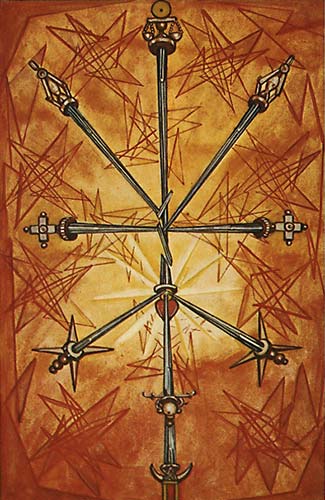
Astrological Correspondence: Sun in Gemini
The Ten of Swords symbolises the culmination of mental struggle and the end of a difficult intellectual phase. The card depicts ten swords arranged in the shape of the Tree of Life, illustrating the collapse of mental structures. This imagery emphasises the breakdown of old thought patterns and the finality of a challenging mental cycle.
This card represents a moment of intense closure, often following conflict, betrayal, or harsh mental realisations. However, it is not merely a card of defeat—it marks the end of a chapter and the potential for renewal. The swords' placement in the Tree of Life suggests that the end of one cycle clears the way for new understanding and growth. Though the situation may feel like a dramatic loss, it carries the seed for transformation, indicating that closure creates space for new possibilities.
In Relationships: The Ten of Swords indicates a painful end or betrayal, often one where mental or emotional abuse has occurred. It may represent the end of a toxic situation or the final straw in a relationship that has been deteriorating for some time. While painful, this card can also indicate that you are ready for closure and can now move on to new possibilities.
In Work: The Ten of Swords signifies a complete failure or collapse of a project or endeavour, often because of betrayal, poor judgement, or harsh realities. It may represent the end of a career or a job but also suggests that this ending is necessary to make way for new opportunities. It's a card of finality and transition, signalling that the worst is over.
Spiritually: The Ten of Swords represents hitting rock bottom mentally and emotionally, but also the possibility of spiritual rebirth. It signals a time when you may have suffered greatly, but this suffering can lead to deeper understanding and growth. It encourages you to release old thought patterns and embrace a fresh, transformative spiritual journey.
When ill-dignified: The Ten of Swords indicates prolonged suffering, often due to an inability to let go of mental hurts or betrayals. It suggests you may be stuck in a cycle of self-inflicted pain, unable to release negative thoughts or emotional baggage. The card warns against dwelling in despair and encourages you to recognise that the worst has passed and that renewal is possible.
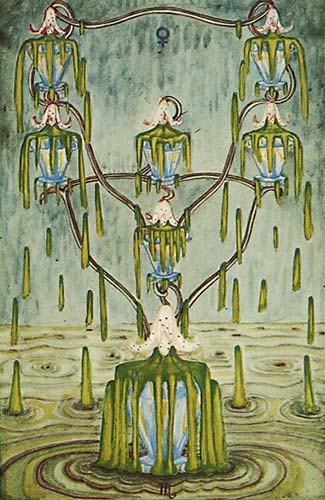
Astrological Correspondence: Venus in Scorpio
The Seven of Cups signifies emotional excess, illusion, and the dangers of overindulgence. This card depicts seven cups arranged chaotically, overflowing with murky, stagnant liquid, emphasising the corruption of pure emotional energy. The imagery conveys decay, as the once-refreshing waters of gladness and emotional fulfilment have become polluted by excess, indulgence, or lack of clarity.
Venus in Scorpio combines the seductive and magnetic qualities of Venus with Scorpio's intensity and depth, highlighting the tension between desire and emotional saturation. This card reflects the risks of being seduced by fleeting pleasures, ungrounded fantasies, or false promises, leading to a state of disillusionment and emotional stagnation.
The Seven of Cups warns against being caught in illusions or distracted by unproductive desires. It challenges us to discern between genuine fulfilment and empty indulgence. While it may tempt us with alluring possibilities, it urges us to ground ourselves, clear emotional confusion, and make choices that lead to lasting satisfaction and renewal.
In Relationships: The Seven of Cups suggests you may face many emotional choices, perhaps feeling uncertain about which path to take. It can indicate a tendency to be drawn to unrealistic or illusory relationships or desires, cautioning you to look beyond appearances and follow your heart.
In Work: The Seven of Cups warns of the dangers of distraction or chasing unrealistic opportunities. You may be overwhelmed by numerous options or distracted by tempting but empty promises. It advises you to focus on practical goals and avoid emotional escapism or fantasy-driven decisions.
Spiritually: The Seven of Cups points to confusion or a scattering of emotional or spiritual energy. You may be pulled in multiple directions or have trouble discerning between true spiritual paths and distractions. It invites you to ground yourself, focusing on the path that resonates most deeply with your soul.
When ill-dignified: The Seven of Cups can indicate emotional confusion or disillusionment. You may face excessive emotional choices, each more fleeting than the next, leading to indecision or a lack of emotional clarity. There may be a tendency to become consumed with fantasy at the expense of tangible reality, leading to disappointment.